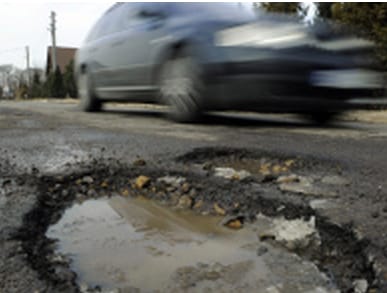The Pothole That Ate My Front Tire

The Yield of a Snowy Winter? A Bumper Crop Of Potholes.
I was planning on getting new boots this winter, but a pothole the size of a watermelon changed all that.
Potholes are more than just an annoyance, they can cause a lot of damage to your car. Potholes are those craters in the road that form when cracks in the asphalt are widened by water, ice and salt, then freeze and expand to push out the dirt and gravel, leaving a hole. Even if you live in an area without freezing temperatures, large amounts of water in a rainy season can do just as much damage. As I drive around St. Louis these days it seems some streets are more pothole than asphalt.
A Pothole’s First Victim: Your Tires
If you think hitting a pothole is uncomfortable to the people in the car, imagine how your tire reacts: the jolt can break the belts inside the tire, causing the tread section to slip out of line, leading to shaking and vibrations, blow holes in the sidewall, and potentially a blowout or flat. This means you’ll most likely need to replace that tire. If your tires are just about worn out, having only 4/32” tread depth, it is recommended to go ahead and replace all the tires on your car. If you do not have an all-wheel drive car and prefer to save a little money you can replace just two tires. Here’s a good guide to checking the depth of your tire tread from Neace Tire in Dayton, Ohio.
But Wait, There’s More: Your Wheels and Suspension Can Be Damaged, Too

Pothole damage can affect the wheel as well as the tire. My husband took this photo of a client’s wheel damaged by hitting pothole
Then, there’s the really good hard hit: when this happens there is a good chance you will do damage to the rim (the wheel) which in turn will probably damage the tire, too. When the rim is bent it is no longer round. Depending on the rim and the amount of damage it will either need repaired or replaced. Vehicles with low profile tires—narrow tires that in the past were usually found on performance cars but have become increasingly popular— are more prone to this type of damage due to the lack of cushioning in the tire.
In addition to harming the wheel, potholes can damage internal suspension parts, too. Many newer vehicles have aluminum suspension components which are more easily bent. A really hard hit can bend parts such as the steering knuckle, control arms, struts, tie rods, or other components.
What You Should Do After Hitting a Pothole
You know you’ve done damage when your car starts to shake or vibrate. You should take your car to a qualified technician soon. Be sure to tell them that you hit a pothole and which tire or tires took the blow. If you are lucky enough to avoid major potholes but still have hit your share of smaller ones during the season, it’s a good idea to take your car in for tire balance and alignment after your pothole season has ended. The cost of having these services done now can help save you money by prolonging the life of your tires. The alignment will also be able to detect if there is more serious damage that needs attention.
Paying for Pothole Damage: This Time, My Boot Budget; Next Time I’m Getting Insurance
Full coverage auto insurance will usually cover repair costs from potholes, but you have to determine if making a claim is worth it based on your deductible. If you live somewhere prone to potholes, when purchasing new tires consider getting the road hazard insurance option; this may cover tire damage from potholes, nails, and other road hazards. Generally speaking, cities and states are not liable for damages to your car from potholes, though there are exceptions.
What else can you do? Check with your local street departments to see if they have a pothole hotline to report potholes for repair or learn which streets have been repaired; many communities try to keep up with repairs in a more efficient manner. And, avoid potholes when possible. If you see one and have room to go around or change lanes safely, that is your best bet. Slowing down can also help to avoid damage from a pothole, and if you keep your tires properly inflated you’ll also negate damage done to your tire by hitting a pothole.
More About:Car Maintenance
